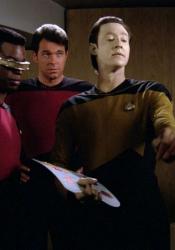Star Trek: The Next Generation (TV Show)
The third in a long line of Star Trek television series (preceded by Star Trek: The Original Series, and Star Trek: The Animated Series), Star Trek: The Next Generation follows the crew of the Enterprise-D as they travel through space and explore the unknown. The crew of the Enterprise is comprised of a variety of species—from humans to Klingons to the telepathic Betazoids—but perhaps its most unique member is Data, a superintelligent android who is third in command of the starship.
Despite the fact that he is in many ways superior to a human, Data expresses his desire to be human on more than one occasion. He regularly exhibits complex “human” emotions such as grief and guilt, and is capable of maintaining relationships with his human and alien crewmates. A significant portion of Star Trek: The Next Generation is devoted to exploring the character of Data and his struggle with being somewhat less than human.
“11001001”
In the season one episode “11001001” (aired February 1st, 1988), Data makes an “attempt at pure creativity” through painting. Guided by Lieutenant Geordi LaForge, Data creates an image of Zylo eggs. Born without vision, Geordi uses a VISOR (Visual Instrument and Sensory Organ Replacement) to see. However, he does not see as typical humans do, but rather sees throughout the electromagnetic spectrum. Upon encountering the pair painting, Commander Riker comments on the irony of the situation: “A blind man teaching an android how to paint? That’s got to be worth a couple of pages in somebody’s book.”
“The Measure of a Man”
The episode “The Measure of a Man” (a season two episode aired February 13th, 1989) explores the issue of android rights. After being declared property of Starfleet, Data petitions for his freedom and the right to make his own decisions. The prosecution against Data claims that he is a machine, much like the computer aboard the Enterprise, and should have no rights greater than those of any other machine. Captain Picard fights back by classifying Data as “new life”, and equating the forced ownership of him to slavery. When the plaintiff asserts that Data is not sentient, Captain Picard calls into question the definition of sentience by requesting that he “prove to the court that I [Picard] am sentient”.
Author: Olivia Peel

